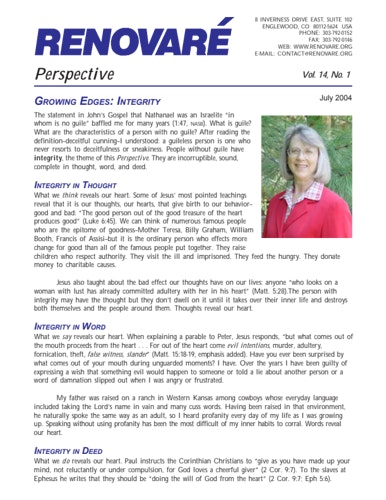The statement in John’s Gospel that Nathanael was an Israelite “in whom is no guile” baffled me for many years (1:47, NASB). What is guile? What are the characteristics of a person with no guile? After reading the definition – deceitful cunning – I understood: a guileless person is one who never resorts to deceitfulness or sneakiness. People without guile have integrity, the theme of this Perspective. They are incorruptible, sound, complete in thought, word, and deed.
INTEGRITY IN THOUGHT
What we think reveals our heart. Some of Jesus’ most pointed teachings reveal that it is our thoughts, our hearts, that give birth to our behavior– good and bad: “The good person out of the good treasure of the heart produces good” (Luke 6:45). We can think of numerous famous people who are the epitome of goodness – Mother Teresa, Billy Graham, William Booth, Francis of Assisi – but it is the ordinary person who effects more change for good than all of the famous people put together. They raise children who respect authority. They visit the ill and imprisoned. They feed the hungry. They donate money to charitable causes.
Jesus also taught about the bad effect our thoughts have on our lives: anyone “who looks on a woman with lust has already committed adultery with her in his heart” (Matt. 5:28). The person with integrity may have the thought but they don’t dwell on it until it takes over their inner life and destroys both themselves and the people around them. Thoughts reveal our heart.
INTEGRITY IN WORD
What we say reveals our heart. When explaining a parable to Peter, Jesus responds, “but what comes out of the mouth proceeds from the heart … For out of the heart come evil intentions, murder, adultery, fornication, theft, false witness, slander” (Matt. 15:18 – 19, emphasis added). Have you ever been surprised by what comes out of your mouth during unguarded moments? I have. Over the years I have been guilty of expressing a wish that something evil would happen to someone or told a lie about another person or a word of damnation slipped out when I was angry or frustrated.
My father was raised on a ranch in Western Kansas among cowboys whose everyday language included taking the Lord’s name in vain and many cuss words. Having been raised in that environment, he naturally spoke the same way as an adult, so I heard profanity every day of my life as I was growing up. Speaking without using profanity has been the most difficult of my inner habits to corral. Words reveal our heart.
INTEGRITY IN DEED
What we do reveals our heart. Paul instructs the Corinthian Christians to “give as you have made up your mind, not reluctantly or under compulsion, for God loves a cheerful giver” (2 Cor. 9:7). To the slaves at Ephesus he writes that they should be “doing the will of God from the heart” (2 Cor. 9:7; Eph 5:6). But how can we come to the place where we have a heart and mind that prompts us to do what is best for those around us and ourselves automatically and with integrity? For me I have found that this can be accomplished only as a result of practicing such Spiritual Disciplines as meditation and submission and worship and fasting and celebration. Talking with God about what we’re doing together, studying the Bible and reading spiritual classics, practicing simplicity, and all of the other disciplines work into our hearts God’s goodness and, as Jesus said, “good treasure of the heart produces good.” Deeds reveal our heart.
FAREWELL
By the time you receive this, I will have retired. This is the last essay that I will write for the Perspective. Compiling all of the issues and occasionally writing articles for fourteen years has been work … and fun. I will miss it. I will also miss reading the letters you have written about the many issues we have discussed. To the faithful readers I do not know, I’m anxious to meet you in heaven. To those I do know, I’m looking forward to an eternity of interesting conversations. To everyone, may God shower abundant life upon you now and forever.
Blessings,
Lynda L. Graybeal
Text First Published July 2004


